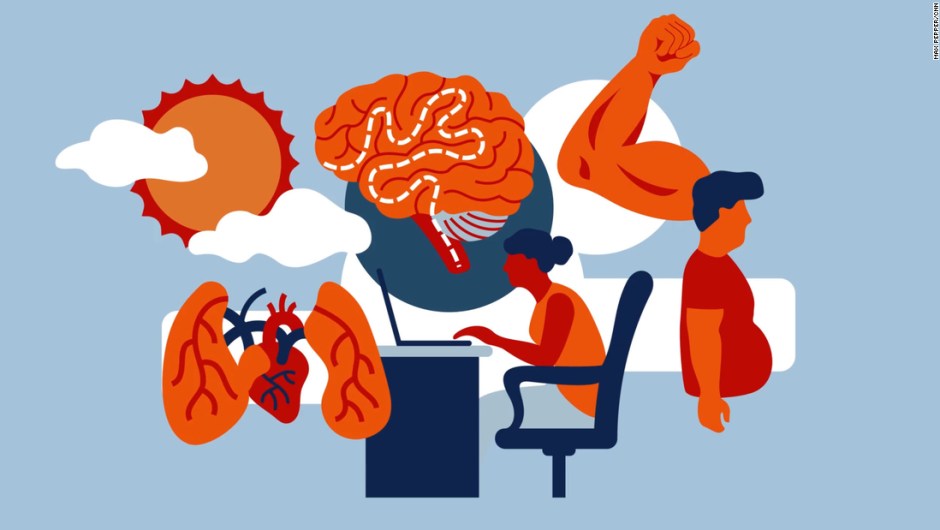(CNN) -
Since the pandemic officially began in March, we have been told that staying home is the best way to avoid contracting covid-19.
And it is.
But life in confinement can cause ailments in the body.
Being confined to home for so long contorts the body, weakens the heart and lungs, and even impairs brain function.
The effects of life in isolation can remain with us beyond the end of the pandemic (whenever that happens).
This is what half a year of isolation, staying home and being sedentary can do to your body.
You start to lose muscle
https://cdn.cnn.com/cnn/.e/interactive/html5-video-media/2020/09/22/covid_body_impact_MUSCLE_21.webm
A week confined to home, whether you're working, eating, or sleeping, can feel comforting and needed.
But all the inactivity can undo your hard-earned progress.
That's because it can take months to build muscle and only a week to lose it.
Humans, despite our endurance, also lose muscle more rapidly as we age, said Keith Baar, professor of molecular exercise physiology at the University of California - Davis.
When you lose muscle, you're not necessarily losing bulk, but you're losing strength, which Baar says is one of the "strongest indicators" of how long you'll live.
"The stronger we stay, the easier it will be for us to maintain our longevity."
Your heart and lungs weaken
https://cdn.cnn.com/cnn/.e/interactive/html5-video-media/2020/09/22/covid_body_impact_HEART_LUNGS_comp1.webm
If you don't exercise, you don't increase your heart rate.
And when your heart doesn't beat that hard, it gets weak, Baar said.
The same thing happens to your lungs when you're inactive, said Dr. Panagis Galiatsatos, a pulmonologist at Johns Hopkins Bayview Medical Center.
He noted that many of his patients have felt their respiratory function deteriorate because they are no longer conditioned to exercise.
People with poor lung health are already considered more susceptible to the coronavirus because it is a respiratory disease, so they are likely to stay home to reduce the risk of infection.
But if they don't move and increase blood flow to your lungs, then your pre-existing condition could harm them anyway.
Exercise is the only key to improving heart and lung function: "Not a single drug can do that," Galiatsatos explained.
If it's not safe to leave the house, Baar recommends dancing or looking for household items for strength training at home - consider deadlifts with the milk jug.
You gain fat
https://cdn.cnn.com/cnn/.e/interactive/html5-video-media/2020/09/22/covid_body_impact_FAT1.webm
If you are at home all day, every day, you are probably a few feet from your pantry.
Depending on your perspective, that is either convenient or dangerous.
With such easy access, your "eating" window, or the time period during which you eat most of your meals, could be extended from 10 or 12 hours every day to 15 hours a day, more than half the day , which could cause your insulin levels to spike.
Insulin stimulates fat storage and converts other fat molecules to fat, explained Giles Duffield, an associate professor of anatomy and physiology at the University of Notre Dame who studies circadian rhythms and metabolism, among other topics.
Overeating is also a problem because, at the beginning of the pandemic, many people stocked up on non-perishable food in case of a supply shortage, Duffield said.
Many non-perishable foods are highly processed and rich in sugars and starches.
Weight gain during periods of intense stress is normal, and 2020 has been incessantly stressful.
However, weight gain becomes dangerous when you become obese.
Then your body could start to resist insulin and chronic health problems like metabolic diseases or diabetes could develop, Duffield said.
Your posture is affected
https://cdn.cnn.com/cnn/.e/interactive/html5-video-media/2020/09/22/covid_body_impact_POSTURE1.webm
We all have a sitting position in which we unconsciously sink: slumped forward, shoulders hunched;
curved spine, bent neck;
on your chest, elbows up.
But sitting and lying down all day can seriously affect your posture and strain your back, neck, shoulders, hips and eyes, said Brandon Brown, an epidemiologist and associate professor at the Center for Healthy Communities at the University of California - Riverside.
LOOK: 1918 influenza pandemic vs.
coronavirus in 2020: what the past can teach us
Brown suggests getting up from your seat once an hour, walking, and stretching for a moment.
You could even lie down on the floor and "let your back readjust," he said.
Your dream suffers
https://cdn.cnn.com/cnn/.e/interactive/html5-video-media/2020/09/22/covid_body_impact_VITAMIN_D_21.webm
At least half of all Americans have reduced vitamin D, which maintains bone density and keeps fatigue at bay.
You're definitely one of them if you spend most of the day at home, with the curtains down, Duffield said.
Getting enough sunlight in the morning helps synchronize your body's circadian rhythm, Duffield said.
So if you are locked up all week or working in the dark, your sleep can be affected as well.
Brown explained that as long as you go for a walk or exercise, garden, or other activities that drag you a bit outside, you won't have to worry about getting enough sunlight.
If you can't get out of the house or the weather doesn't allow it, bright artificial light can help your body tune in in the morning, Duffield noted, as can avoiding blue lights at night.
Your brain slows down
https://cdn.cnn.com/cnn/.e/interactive/html5-video-media/2020/09/22/covid_body_impact_BRAIN1.webm
A sedentary lifestyle can also slow down your brain.
Exercise produces certain chemicals in the brain that break down toxins in the blood and even prevent them from going to the brain, where they can kill brain cells, Baar said.
Not exercising means that you won't break down the amino acid byproducts that end up as neurotoxins in the brain as efficiently.
The effects of isolation are insidious: Like the pandemic, physical symptoms after months of confinement are often not obvious until they become harmful or extreme.
It is also possible to avoid those symptoms before they appear forever.
Prioritizing your mental and physical health while staying at home takes some work, but it is a healthier coping mechanism for uncertainty than standing still until COVID-19 is no longer a threat, health experts say.
And when it is safe to live fully again, you will be prepared.
covid-19


/cloudfront-eu-central-1.images.arcpublishing.com/prisa/ZVQ5LBKTXFHDJORVBNAZ443NPM.jpg)



